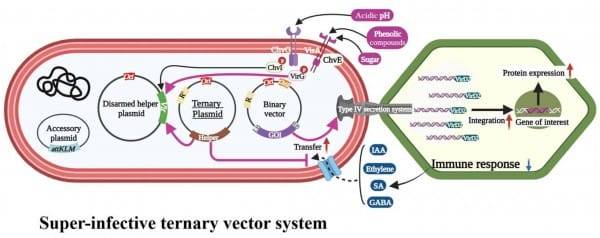Main Points In Hindi (मुख्य बातें – हिंदी में)
-
एग्रोबैक्टीरियम का महत्व: एग्रोबैक्टीरियम-मध्यस्थता वाला पौधा परिवर्तन, फसल इंजीनियरिंग और आणविक आनुवंशिकी में महत्वपूर्ण प्रगति का आधार है, लेकिन अनेक फसलों की रासायनिक और प्रतिरक्षा प्रतिक्रियाएँ इसके प्रयासों को विफल कर देती हैं।
-
नवीन वेक्टर प्रणाली: नुल्ला बायो इंक. और ग्योंगसांग नेशनल यूनिवर्सिटी के शोधकर्ताओं ने "सुपर-संक्रामक" टर्नरी वेक्टर प्रणाली विकसित की है, जो पौधों के रक्षा अणुओं को तोड़ने के लिए एग्रोबैक्टीरियम को एंजाइम देते हैं, जिससे आनुवंशिक सामग्री वितरित करना संभव होता है।
-
उपलब्धियां: इस शोध में विकसित छह अलग-अलग वेक्टर वेरिएंट्स ने कई फसलों पर जीन संपादन दक्षता को 18 गुना और स्थिर परिवर्तन दर को 2.5 गुना बढ़ाने में सफलता हासिल की है।
-
संभावित लाभ: यह प्रगति कृषि में स्थिरता को नया आकार देने की संभावना रखती है, जिससे किसान उत्पादकता, पर्यावरणीय तनाव सहनशीलता और पौषण में वृद्धि की उम्मीद कर सकते हैं।
- वैश्विक खाद्य सुरक्षा: यह तकनीक विभिन्न पौधों की प्रजातियों के लिए अनुप्रयोग प्रस्तुत करती है, जिससे वैश्विक खाद्य सुरक्षा चुनौतियों का समाधान किया जा सकता है, और एक अधिक लचीले व कुशल कृषि भविष्य की ओर मार्ग प्रशस्त किया जा सकता है।
Main Points In English(मुख्य बातें – अंग्रेज़ी में)
Here are 5 main points from the provided text regarding advancements in plant transformation and genetic engineering using Agrobacterium:
-
Importance of Agrobacterium-Mediated Plant Transformation: Agrobacterium-mediated plant transformation has been a critical technique for decades, significantly contributing to advancements in crop engineering and molecular genetics. However, many plants remain resistant due to their chemical defenses and immune responses.
-
Development of "Super-Infectious" Vectors: Researchers from Nullah Bio Inc. and Gyeongsang National University developed a series of "super-infectious" ternary vector systems equipped with enzymes that can break down plant defense molecules such as salicylic acid and ethylene, thereby enhancing genetic transformation efficiency.
-
Dramatic Improvements in Gene Editing Efficiency: The research team created six different vector variants, one of which (TV-VS) increased genome editing efficiency by up to 18 times and stable transformation rates by 2.5 times in crops such as Cannabis sativa and tomatoes, showcasing significant advancements in the field.
-
Implications for Agricultural Biotechnology: The ability to overcome plant immune responses represents a transformative step in plant biotechnology, allowing for more efficient genetic modifications, even in challenging crops, which could lead to higher yields and improved nutritional benefits.
- Potential for Sustainable Agriculture: The advancements in gene editing could reshape sustainable agriculture, providing resilient crops that can withstand environmental stress and contribute to global food security challenges, thus paving the way for more efficient agricultural practices.


Complete News In Hindi(पूरी खबर – हिंदी में)
एग्रोबैक्टीरियम-मध्यस्थता वाला पौधा परिवर्तन दशकों से महत्वपूर्ण रहा है, जिससे फसल इंजीनियरिंग और आणविक आनुवंशिकी में प्रमुख प्रगति हुई है। हालाँकि, कई फसलें रसायनों और प्रतिरक्षा प्रतिक्रियाओं के भंडार के साथ खुद का बचाव करते हुए प्रतिरोधी बनी रहती हैं। सैलिसिलिक एसिड, एथिलीन और अन्य अणु आनुवंशिक सामग्री वितरित करने के एग्रोबैक्टीरियम के प्रयासों को विफल कर देते हैं। इन बाधाओं का सामना करते हुए, शोधकर्ताओं ने लंबे समय से परिवर्तन दक्षता में सुधार करने और पौधों की व्यापक विविधता में सफल जीन संपादन सुनिश्चित करने के लिए एक अधिक प्रभावी तरीका खोजा है।
10 जुलाई, 2024 को, नुल्ला बायो इंक. और ग्योंगसांग नेशनल यूनिवर्सिटी के शोधकर्ताओं ने एक प्रकाशित किया अध्ययन (DOI: 10.1093/घंटा/uhae187) में बागवानी अनुसंधान. उन्होंने “सुपर-संक्रामक” टर्नरी वेक्टर सिस्टम की एक श्रृंखला विकसित की जो पौधों के रक्षा अणुओं को तोड़ने के लिए एग्रोबैक्टीरियम को एंजाइमों से लैस करती है। सैलिसिलिक एसिड, एथिलीन और जीएबीए को निष्क्रिय करके, ये वैक्टर प्रतिकूल पौधों के वातावरण को आनुवंशिक वितरण के लिए अनुकूल मैदान में बदल देते हैं। इस दृष्टिकोण से पहले से ही जीन स्थानांतरण और संपादन दक्षता में नाटकीय सुधार हुआ है।
अनुसंधान टीम ने छह अलग-अलग वेक्टर वेरिएंट तैयार किए, जिनमें से प्रत्येक को एक अनोखे तरीके से पौधों की सुरक्षा को निष्क्रिय करने के लिए तैयार किया गया। कैनबिस सैटिवा और टमाटर जैसी फसलों पर इनका परीक्षण करने पर, उन्हें अभूतपूर्व परिणाम मिले: एक संस्करण, टीवी-वीएस, ने जीनोम संपादन दक्षता को 18 गुना तक बढ़ा दिया और स्थिर परिवर्तन दर को 2.5 गुना तक बढ़ा दिया। यह गेम चेंजर है. रहस्य संवैधानिक रूप से सक्रिय विषाणु जीन को एंजाइमों के साथ संयोजित करने में निहित है जो पौधों की सुरक्षा को नष्ट कर देते हैं, जिससे यह सुनिश्चित होता है कि एग्रोबैक्टीरियम बिना किसी रुकावट के अपना काम कर सकता है।
प्रमुख शोधकर्ताओं में से एक डॉ. जिन-ही जियोंग ने बताया, “यह पादप जैव प्रौद्योगिकी में एक परिवर्तनकारी कदम का प्रतिनिधित्व करता है।” “पौधों की प्रतिरक्षा प्रणाली पर काबू पाकर, हम आनुवंशिक संशोधनों को अधिक कुशलता से कर सकते हैं, यहां तक कि सबसे चुनौतीपूर्ण फसलों में भी। कृषि और जैव प्रौद्योगिकी के लिए संभावित अनुप्रयोग बहुत अधिक हैं।”
इस प्रगति के निहितार्थ टिकाऊ कृषि को नया आकार दे सकते हैं। अधिक कुशल जीन संपादन के साथ, किसान जल्द ही ऐसी फसलें देख सकते हैं जो अधिक उपज देती हैं, पर्यावरणीय तनाव का विरोध करती हैं और अधिक पोषण लाभ प्रदान करती हैं। चूंकि प्रौद्योगिकी विभिन्न पौधों की प्रजातियों के लिए तैयार की गई है, इसलिए यह वैश्विक खाद्य सुरक्षा चुनौतियों से निपटने के लिए आधारशिला बन सकती है, जिससे अधिक लचीले और कुशल कृषि भविष्य का मार्ग प्रशस्त होगा।
###
संदर्भ
डीओआई
मूल स्रोत यूआरएल
https://doi.org/10.1093/hr/uhae187
फंडिंग संबंधी जानकारी
इस कार्य को कोरिया के राष्ट्रीय अनुसंधान फाउंडेशन (अनुदान NRF 2020M3A9I4038352, 2021R1A5A8029490, 2022R1A2C3010331), R&D परिणामों के लिए व्यावसायीकरण संवर्धन एजेंसी (NTIS# 1711174911) द्वारा समर्थित किया गया था।
के बारे में बागवानी अनुसंधान
बागवानी अनुसंधान नानजिंग कृषि विश्वविद्यालय की एक ओपन एक्सेस पत्रिका है और क्लैरिवेट, 2022 से जर्नल उद्धरण रिपोर्ट ™ की बागवानी श्रेणी में नंबर एक स्थान पर है। पत्रिका मूल शोध लेख, समीक्षा, दृष्टिकोण, टिप्पणियां, पत्राचार लेख और पत्र प्रकाशित करने के लिए प्रतिबद्ध है। जैव प्रौद्योगिकी, प्रजनन, सेलुलर और आणविक जीव विज्ञान, विकास, आनुवंशिकी, अंतर-प्रजाति परस्पर क्रिया, शरीर विज्ञान और फसलों की उत्पत्ति और पालतूकरण सहित सभी प्रमुख बागवानी पौधों और विषयों से संबंधित संपादक।
Complete News In English(पूरी खबर – अंग्रेज़ी में)
Agrobacterium-mediated plant transformation has been crucial for decades, leading to significant advancements in crop engineering and molecular genetics. However, many crops remain resistant due to their ability to defend themselves with chemicals and immune responses. Molecules like salicylic acid and ethylene can hinder Agrobacterium’s efforts to deliver genetic material. In response to these challenges, researchers have long sought a more effective method to enhance transformation efficiency and ensure successful gene editing across a wide variety of plants.
On July 10, 2024, researchers from Nulab Bio Inc. and Gyeongsang National University published a study in Horticultural Research. They developed a series of “super-infectious” ternary vector systems that equip Agrobacterium with enzymes to break down plant defense molecules. By inactivating salicylic acid, ethylene, and GABA, these vectors transform the hostile environment for genetic distribution into a more favorable one. This approach has already led to dramatic improvements in gene transfer and editing efficiency.
The research team created six different vector variants, each designed to disable plant defenses in a unique way. Testing these on crops like cannabis and tomatoes yielded unprecedented results; one variant, TV-VS, increased genome editing efficiency by up to 18 times and raised the stable transformation rate by 2.5 times. This breakthrough involves combining genetically active viral genes with enzymes that dismantle plant defenses, ensuring that Agrobacterium can perform its role without interruption.
Dr. Jin-Hee Jeong, one of the lead researchers, stated, “This represents a transformative step in plant biotechnology. By overcoming the plant’s immune system, we can efficiently make genetic modifications, even in the most challenging crops. The potential applications for agriculture and biotechnology are vast.”
This advancement could reshape sustainable agriculture. With more efficient gene editing, farmers may soon see crops that produce higher yields, resist environmental stresses, and offer greater nutritional benefits. As the technology is tailored for various plant species, it could serve as a cornerstone in addressing global food security challenges, paving the way for a more resilient and efficient agricultural future.
###
References
DOI
Original source URL
https://doi.org/10.1093/hr/uhae187
Funding information
This work was supported by the National Research Foundation of Korea (grants NRF 2020M3A9I4038352, 2021R1A5A8029490, 2022R1A2C3010331) and the R&D Results Commercialization Promotion Agency (NTIS# 1711174911).
About Horticultural Research
Horticultural Research is an open-access journal from Nanjing Agricultural University and has been ranked number one in the Horticulture category of the Journal Citation Reports™ since 2022. The journal publishes original research articles, reviews, perspectives, comments, letters, and correspondence on all major horticultural plants and topics, including biotechnology, breeding, cellular and molecular biology, development, genetics, inter-species interactions, physiology, and crop domestication.




